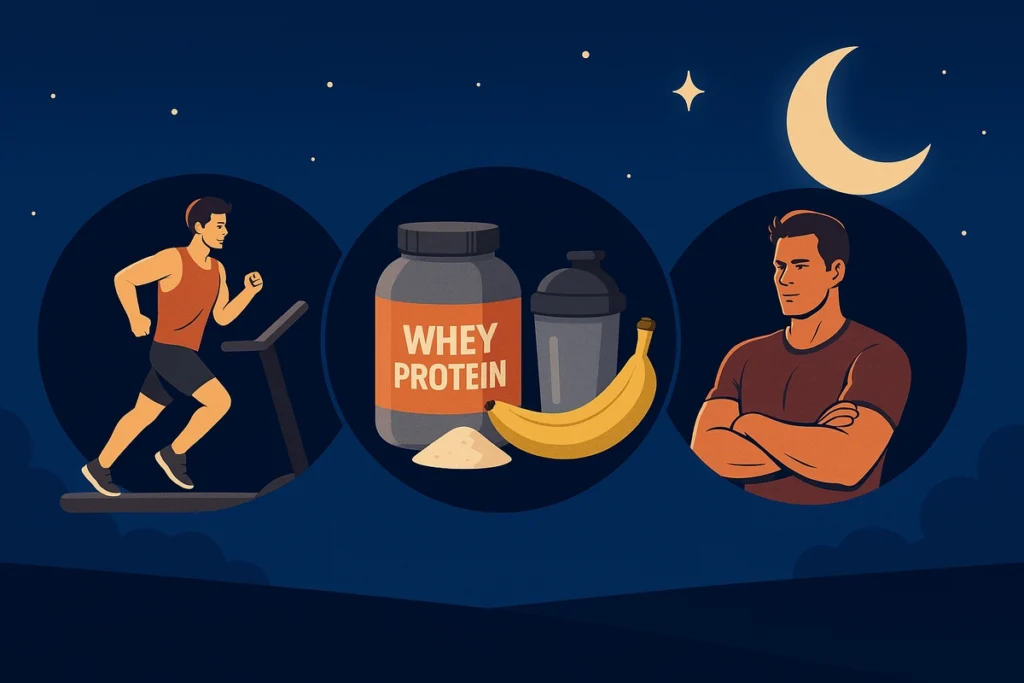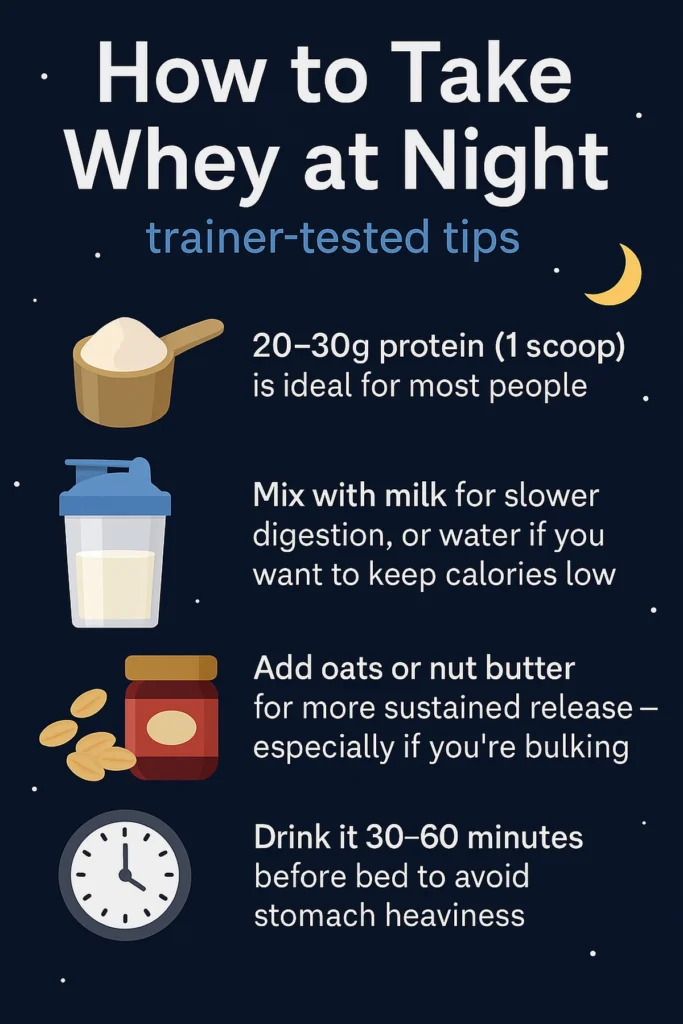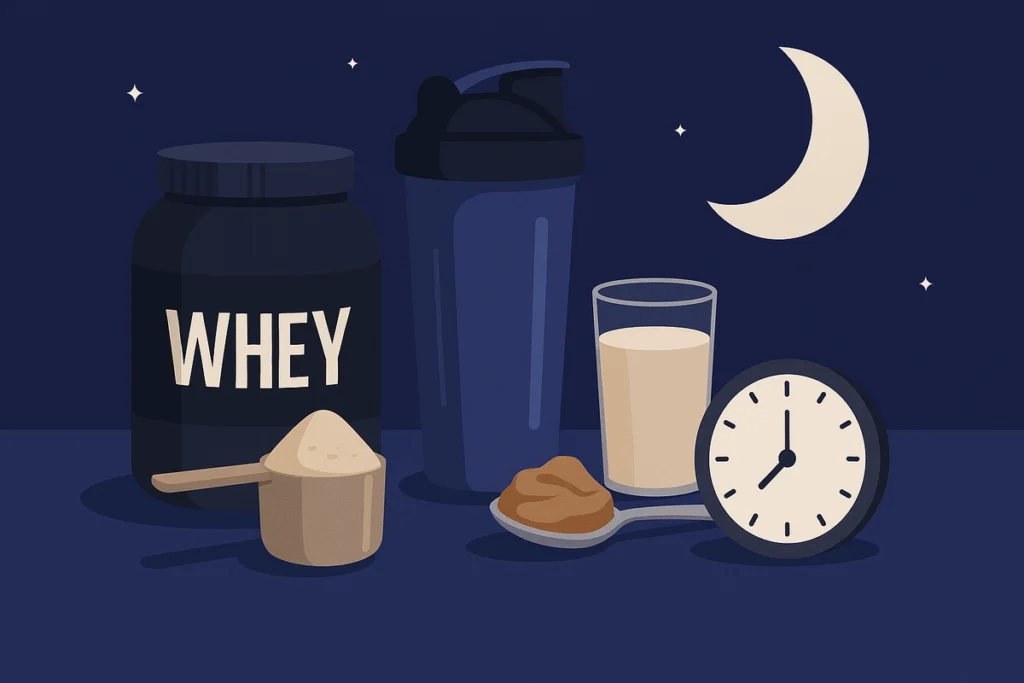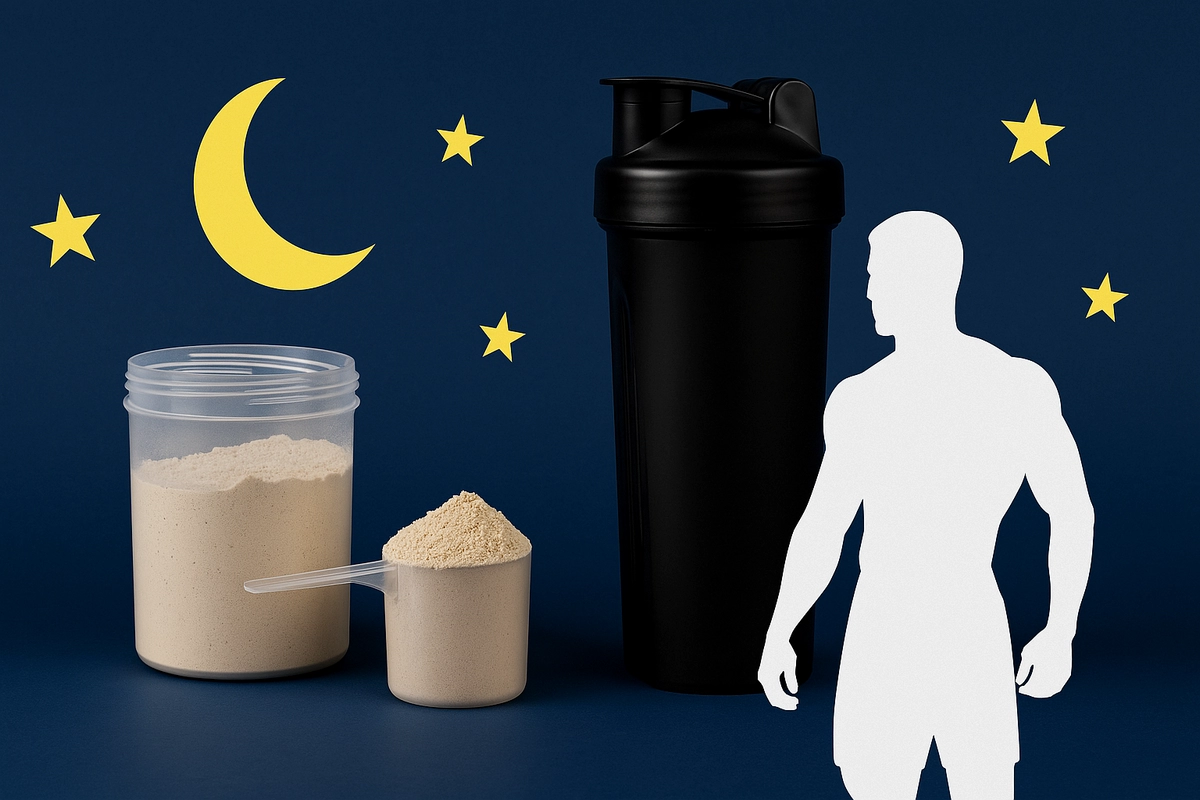As a fitness coach, I’ve worked with clients from all around the world — from lean hardgainers to busy professionals in their 40s. And one question keeps popping up:
Is it okay if I take whey protein before bed?
Here’s the straight-up answer:
Yes — not only is it okay, but for many people, it’s one of the best times to take it.
Whether your goal is muscle growth, fat loss, or better recovery, nighttime whey can absolutely support your progress — if you do it right.
Let me walk you through the why, when, and how — and I’ll also share real coaching stories from my own clients to help you see how this works in real life.
Table of contents
Why Take Whey Protein at Night?

1. Muscle Recovery Happens While You Sleep
Sleep is your body’s prime time for repair. After training, especially in the evening, your muscles need nutrients to rebuild. If you go to bed on an empty stomach, your body might start breaking down muscle to cover the gap — something we definitely don’t want.
Whey protein provides high-quality amino acids, fast, right when your body needs them. It’s like delivering bricks to a construction site before the workers show up.
2. Whey = Easy, Digestible Protein Source
Whey is fast-digesting, rich in essential amino acids, and easy to drink. If you’ve trained late or simply need to hit your daily protein goal, whey at night is a quick solution without loading your stomach.
3. You Stay in an Anabolic State
Going to bed hungry (especially when cutting) can push your body toward catabolism — where it breaks down muscle for energy. A light whey shake can help keep you in a positive nitrogen balance.
When Does Nighttime Whey Make the Most Sense?

Late Night Training?
If you work out in the evening like many of my clients do, whey before bed is perfect.
Take David, a 42-year-old executive from London.He could only train after 8 PM due to work. He often complained of waking up sore and stiff.
I recommended a post-workout whey shake mixed with low-fat milk about 30 minutes before bed. After just two weeks, his recovery improved, soreness dropped, and he started hitting personal bests more consistently.
Struggling to Eat Enough During the Day?
This is common among lean guys and hardgainers. Ali, a 28-year-old engineering student from Istanbul, was barely hitting 1,500 calories a day — no matter how hard we tried. He simply didn’t have the appetite. I had him add a high-calorie shake before bed:
- 1 scoop whey
- 1 banana
- 2 tbsp peanut butter
- Oats
- Almond milk
It became his “night fuel.” He went from 61 kg to 66 kg over three months — mostly lean mass.
Cutting Without Losing Muscle
During my own cutting phases, I always include a scoop of whey before bed. It helps suppress late-night cravings and protects muscle tissue when calories are lower.
I often blend it with unsweetened almond milk and a spoon of peanut butter — easy on the stomach and keeps me full till morning.
How to Take Whey at Night (Trainer-Tested Tips)

- 20–30g protein (1 scoop) is ideal for most people
- Mix with milk for slower digestion, or water if you want to keep calories low
- Add oats or nut butter for more sustained release — especially if you’re bulking
- Drink it 30–60 minutes before bed to avoid stomach heaviness
Real Tip from Coaching:
Michael, a 36-year-old client from Sydney, was waking up hungry at 3 AM. We switched his late dinner to a shake: whey, almond butter, and cinnamon in warm almond milk.
Not only did he sleep deeper, but his weight loss actually improved — likely because he wasn’t raiding the fridge at midnight anymore.
Whey vs. Casein at Night: My Take
People often ask: “Isn’t casein better at night?”
Here’s my answer as a coach: It depends on the goal.
- Whey is fast-digesting and ideal if you train late and need immediate recovery.
- Casein is slower — better if you haven’t trained but want to stay anabolic overnight.
Some advanced clients even mix both. One of my bodybuilder clients, Carlos from Spain, uses 1 scoop whey + 1 scoop casein after night training. He says it’s the perfect combo — fast + slow absorption.
Bottom line: both are effective. Just use what fits your schedule and digestion best.
Are There Any Downsides?
Mostly, whey is well-tolerated. But over the years, I’ve seen a few common issues:
- Bloating or digestion problems – Often caused by cheap whey with artificial fillers.
Lena, a client from Berlin, was using flavored whey with sucralose and thickening agents. We switched her to a clean isolate with digestive enzymes — problem solved in 3 days. - Sleep issues – Some whey products sneak in caffeine (like pre-workout blends). Read labels carefully.
Tip: Always choose a clean, high-quality protein — especially before bed when digestion matters more.
My Final Advice as a Coach

Go to bed with your muscles fed, not your stomach stuffed.
That means no giant meals before bed, but a light, protein-rich shake? Totally fine — and often beneficial.
Also, let’s be honest:
Muscle loss during sleep is not a myth, but it’s manageable. If you’re not eating enough protein or you go too long without food, your body can tap into muscle.
That’s where nighttime whey becomes a powerful prevention tool — especially during calorie deficits or intense training phases.
Final Thoughts
So — is it okay to take whey protein at night? Absolutely — and in many cases, it might be the exact boost your body needs.
If you:
- Train late,
- Need more protein,
- Want better sleep and recovery,
- Or you’re cutting and scared of muscle loss…
Then whey before bed is a smart move — one I’ve used myself and with dozens of successful clients.
Just make sure your overall diet is in check, your whey is high-quality, and you listen to how your body responds.
Got a question? Drop a comment below — I’m here to help.



Leave a Reply